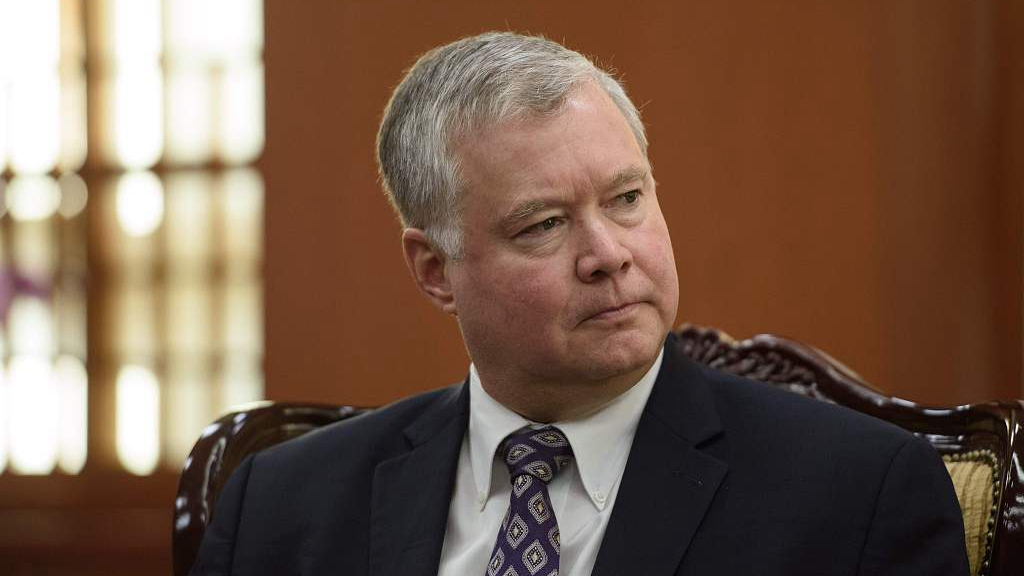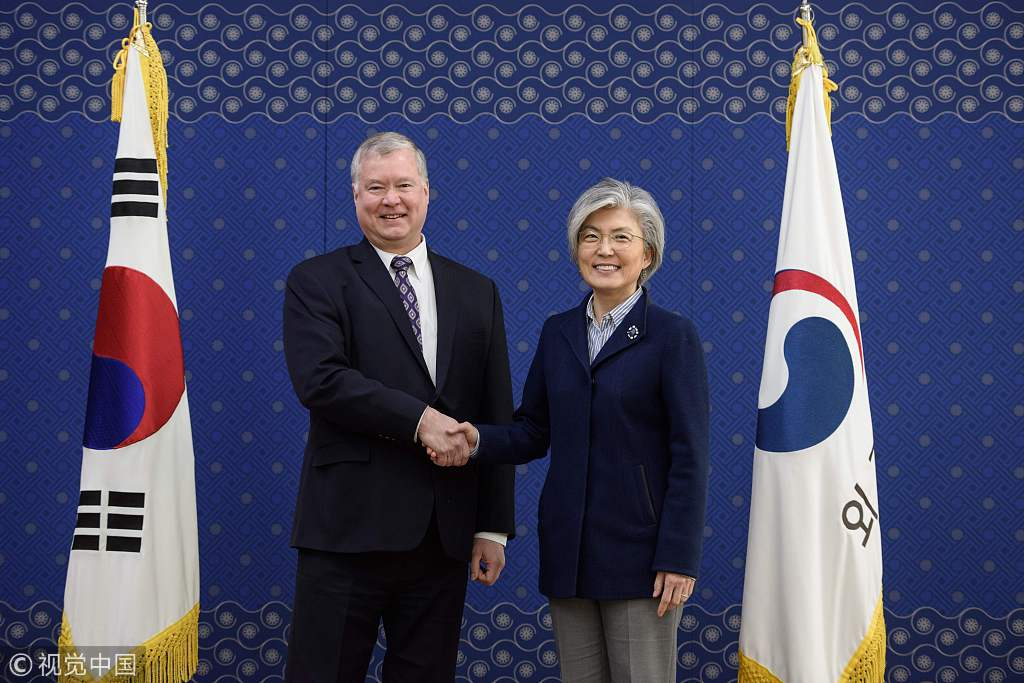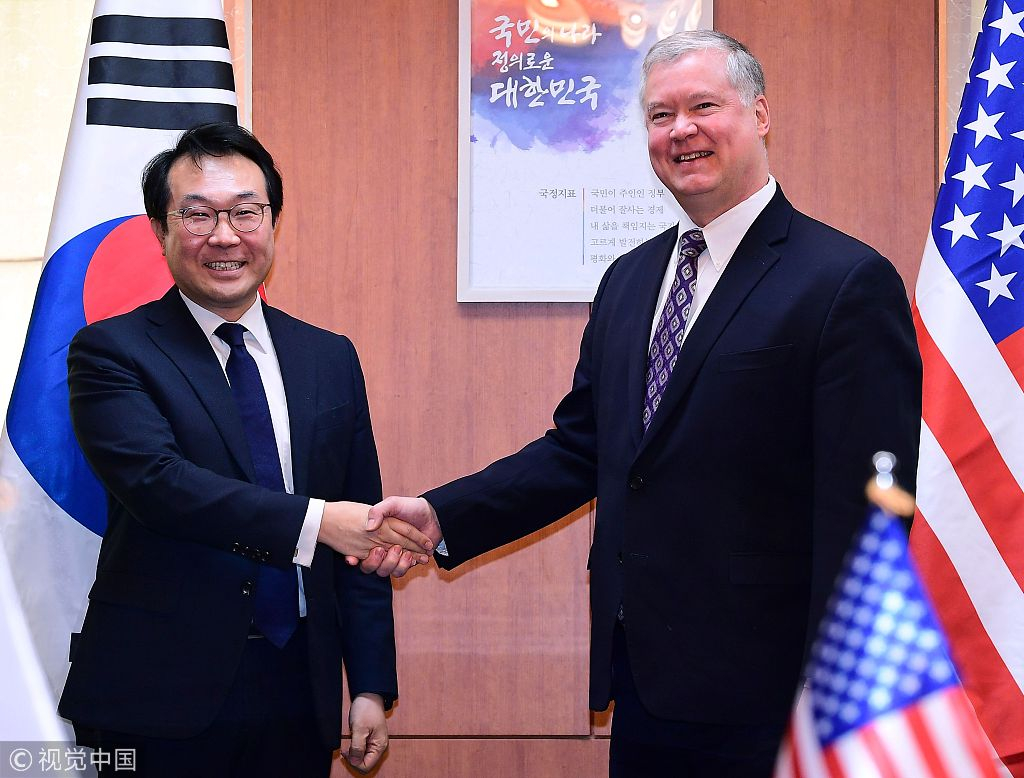
World
08:30, 20-Feb-2019
U.S. envoy for DPRK heads to Vietnam for pre-summit talks
Updated
11:49, 20-Feb-2019
CGTN
00:45

The U.S. special representative for the Democratic People's Republic of Korea (DPRK) is traveling to Hanoi on Tuesday to continue preparations for a second summit between U.S. President Donald Trump and DPRK leader Kim Jong Un to be held next week in Vietnam, the State Department said.
State Department spokesman Robert Palladino told a news briefing he had no details of the meetings Stephen Biegun would have in Hanoi.
Biegun spent three days in the DPRK from February 6-8, a trip he said was aimed at agreeing on "concrete deliverables" for the February 27-28 summit. The State Department said after those talks that Biegun agreed to hold further meetings with his counterpart Kim Hyok Chol ahead of the summit.
Biegun said after that trip his talks in the DPRK had been "productive," but there was "hard work to do" before the summit.
According to Yonhap News Agency, Biegun and his DPRK counterpart are tasked with coordinating the agenda for the summit, which is expected to focus on fleshing out DPRK's denuclearization and corresponding U.S. measures.
The U.S. has been demanding that the DPRK give up a nuclear weapons program that threatens the U.S., and Trump has been eager for a second summit after the first meeting in Singapore in June.

U.S. special representative for the DPRK Stephen Biegun (L) shakes hands with the Republic of Korea's (ROK's) Foreign Minister Kang Kyung-wha (R) in Seoul, February 9, 2019. /VCG Photo
U.S. special representative for the DPRK Stephen Biegun (L) shakes hands with the Republic of Korea's (ROK's) Foreign Minister Kang Kyung-wha (R) in Seoul, February 9, 2019. /VCG Photo
Asked whether the U.S. would consider lifting sanctions, Palladino said "We've been clear on sanctions. These are the world's sanctions, and that is something that ... will continue to be maintained until we've achieved our final result of a fully, finally, verified denuclearization."
However, he then added "but I don't want to get ahead on ... any further details on what's being negotiated regarding that question."
Palladino did not respond directly when asked about reports that the two sides were discussing the exchange of liaison officers and declaring an end to the 1950-53 Korean War.

U.S. special representative for the DPRK Stephen Biegun (R) shakes hands with the ROK's Special Representative for Korean Peninsula Peace and Security Affairs Lee Do-hoon (L), February 9, 2019. /VCG Photo
U.S. special representative for the DPRK Stephen Biegun (R) shakes hands with the ROK's Special Representative for Korean Peninsula Peace and Security Affairs Lee Do-hoon (L), February 9, 2019. /VCG Photo
"I am not going to get ahead of diplomatic conversations, or ahead of the president. A lot of things are being discussed, and we are very much looking forward to next week," he said.
U.S. Secretary of State Mike Pompeo said of Kim last week it was "time for him to deliver," but the Trump administration has moved away from demands that the DPRK gives up its nuclear weapons immediately and has appeared to adopt a more gradual, reciprocal approach Pyongyang has insisted on.
On Tuesday, Trump reiterated that he wants the DPRK to end its nuclear program, but he is in no rush and has no pressing schedule for Pyongyang to denuclearize ultimately.
Pompeo said the U.S. aimed to "get as far down the road as we can" with the DPRK in the next two weeks and that Biegun's team would discuss all issues covered in Singapore.
He said Trump and Kim would also be looking at the "denuclearization pillar they agreed to" in Singapore and how to reduce tension and military risk "so we can get peace and security on the peninsula as well."
(Cover: File photo of U.S. Special Representative for the DPRK Stephen Biegun /VCG Photo)
(With inputs from Reuters)

SITEMAP
Copyright © 2018 CGTN. Beijing ICP prepared NO.16065310-3
Copyright © 2018 CGTN. Beijing ICP prepared NO.16065310-3